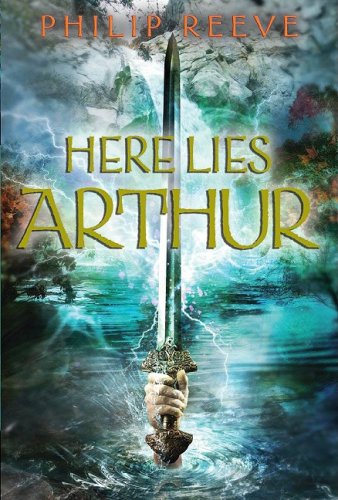
 Here Lies Arthur by Philip Reeve
Here Lies Arthur by Philip Reeve
Here Lies Arthur is a YA deconstruction/demystifying of the King Arthur legend. And a pretty thorough demystifying at that. Philip Reeve doesn’t simply knock Arthur down a peg or two from chivalric magic-sword-wielding king of the Round Table, say, by making him simply a Roman general or an English chieftan who rallies the locals against the Saxons. No, Reeve takes him all the way down; in this incarnation Arthur is a small-minded petty brigand whose major qualities are that he is: boorish, rude, not too bright, vulgar, untrustworthy, unruly, violent (including beating his wife), crude, and (literally) murderous.
In short, there is almost nothing redeeming about him. In fact, take out the “almost” — there is nothing. What he does have is Myrrdin (Merlin), a charlatan of a magician but a master of manipulation and propaganda. Myrrdin is also a man with a vision and a plan to achieve it. For reasons we don’t learn until late, Myrrdin hates the Saxons and believes fiercely that without a strong leader in Britain, the Saxons will storm out from their holdings in the East and ravage the rest of Britain, now divided up into a few large states ruled by kings or chiefs, small fiefdoms, and even smaller areas ruled by local warlords. For whatever reason, Myrrdin has set on Arthur as the “One” and so he advises Arthur as to who to woo and who to fight, where to make his base of operations, who to marry, etc. But most importantly, Myrrdin tells stories — the ones we know as the Arthurian legend. He wanders the country and sings (he’s a bard) of Arthur’s exploits against Giants, the Great Boar, the Green Knight, and so on. It matter not that some of his listeners have even met Arthur or seen his work firsthand. “People see what they want to see, believe what they want to believe” is Myrrdin’s mantra, and so he crafts what he knows they want.
The book is narrated by Gwynna, a young girl Myrrdin meets in the first chapter and whom he uses as a prop in the “Lady of the Lake gives Arthur a magical sword” scene. Myrrdin becomes attached to Gwynna and, disguising her as a boy, takes her into his service. When a few years pass and the disguise starts to become untenable, Myrrdin just removes the “boy” and his “half-sister” shows up (as always, people see what they expect to see).
Gwynna’s voice is one of the bright spots in the book, beginning with a strongly compelling opening scene as she tries to escape fire. The most interesting part of the book isn’t Arthur possible growth into the king of legend but Gwynna’s own growth — her transformation from girl to boy, then to young woman (with some good insights into the worlds of each, which are portrayed realistic to the time and not in some “wouldn’t it be nice if they thought the same way we do” portrayal) and her movement from a timid follower into a strong-willed individual. Along the way, we see Myrrdin and Gwynna herself create much of the mythology we now think of as “Arthurian.”
Beyond Gwinna, though, there isn’t a lot in Here Lies Arthur that is particularly compelling. The “gritty” Arthur has been done in other versions, though he rarely is portrayed so harshly, and while Reeve’s version is fine, it never strikes one as brightly original. Arthur is not only unlikeable as a character, he’s mostly off-stage so he isn’t really much of a character at all except for a few scenes. Mostly he’s an abstraction — either as an ideal under construction (the Arthur of legend) or as a picture of crude and violent brigandry. In any case, though, he never comes alive. The same is surprisingly true of Myrrdin, whom we mostly see playing his role or explaining his role. Except for a few strong scenes, he too never feels fully fleshed out enough to move the reader. Secondary characters suffer as well — Guinevere, Bedivere, Cei.
In fact, the biggest complaint I had about Here Lies Arthur is that this same sketchiness runs throughout — the settings, the plot, the characters. It felt like a good idea had been “YA’d down” — all the rich bits that make a novel stand out in the reader’s mind removed so the book moved more quickly and was short enough for a YA. True, this is often a problem with YA, but Reeve has already shown himself to be a better YA author with Larklight, and even a great one with his Hungry City series. But then, those books are longer and move along a much broader canvas. Here Lies Arthur isn’t a bad book, but it’s disappointing from someone like Reeve. Recommended for those with a strong interest in all things Arthur, but otherwise, I’d spend my reading time elsewhere, say with Hungry City — a much, much more rewarding read.



How did I miss this? Thanks for bringing it to my attention!
I guess that is true, Marion. And when it comes to "You Only Live Twice," I saw the movie TWICE…
I absolutely loved this deep dive into Edwige Fenech's giallo films! Her unique blend of allure and mystery truly captivates.…
You managed to work in your two loves; vintage fiction and films!
Yup, Marion, your memory serves you well! Oh...as regards these three recent Bond reviews of mine, as the old saying…